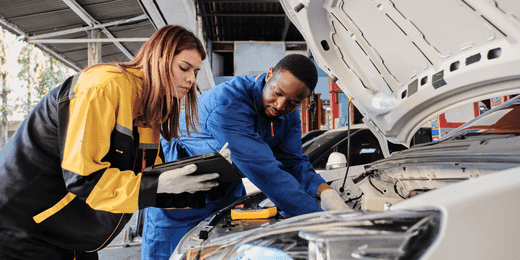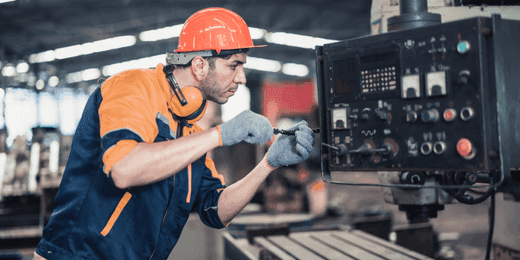The Benefits of Utilizing Agricultural Machinery
Discover why agricultural machinery is such an essential part of farm operations.

Published 14 Mar 2025
Article by
7 min read
What is Agricultural Machinery?
Agricultural machinery, also known as agricultural tech, is an essential tool for improving agricultural production. It helps farmers grow more crops in less time and with greater efficiency. It can include anything from tractors and harvesters to animal feed mixers or field-wide weed removers.
Advantages of Farm Machinery
Here are the most significant benefits of utilizing agricultural machinery:
Improves Existing Techniques
Agricultural mechanization practices have improved land reclamation, reduced soil erosion, and made irrigation systems more efficient. The cultivators attached to tractors help to smooth out the soil, fill in ditches and remove weeds, which all help to increase the amount of land used and prevent soil from eroding.
Boosts Farm Productivity for Commercialization
Agricultural mechanization has primarily replaced subsistence farming, increasing productivity and crop yields. Mechanization has enabled commercial farmers to produce far more food for profit.
Nullifies Effects of Labor Shortages
In recent years, many people in rural areas have moved to cities because of more jobs. But this has left farms needing more workers. Farm workers are no longer required to work as hard because machines are doing some of their work.
Makes More Space for Crops
Using the mechanization process, we can use land more efficiently. Machines can make land arable and allow to grow a wider variety of crops.
Increases Farm Income
Agricultural mechanization provides more monetary gain for large and small farms and reduces the time needed to pay laborers. Crop yields are higher with machinery, thus increasing farm profits.
Type of Machinery According to Use
A diverse range of machines is available, each designed for specific purposes.
Machinery Used for Soil Cultivation
Cultivator – A machine used to mix and pulverize soil before planting.
Cultipacker – Tool that farmers use to squash clods of dirt, get rid of air pockets, and press small stones down into the ground.
Plough – Used to turn over the top layer of soil, bring fresh nutrients to the surface, and prepare the soil for planting.
Strip-till – Combines the advantages of conventional tillage and no-till practices in a minimal tillage system.
Machinery Used for Planting
Seed drill – A machine that allows you to sow seeds in furrows at an even depth and rate. Soil is not required for it to work.
Broadcast seeder – Otherwise known as a spreader or fertilizer spreader, is commonly used for agricultural purposes such as spreading seed, lime, or fertilizer.
Seed cum fertilizer drill – Distributes the fertilizer or soil amendment uniformly on the ground.
Farm Machinery Types Used for Irrigation
Irrigation equipment – Includes pumps , sprinklers, and other automated systems for watering crops.
Fire sprinkler system – Pipes connected to a water supply and used to control fires.
Centre irrigation – Used for large-scale farming operations, delivers water from the center of a field.
Machinery Used for Fertilizing and Pest Control
Manure spreader – Also known as a muck spreader or honey wagon, this agricultural machine spreads manure over a field to fertilize it.
Slurry tank – A trailer with a pump and tank that can mix manure and water, creating an efficient fertilizer for fields.
Sprayer – A tool that applies herbicides, pesticides, and fertilizers to crops.
Harvesting and Threshing Equipment
Combine harvester – A machine that shakes the grain off the stalk, cleans it, and stores it.
Sickle – An agricultural tool used for harvesting grain crops or cutting grass for hay.
Mower – A machine used to cut crops or grasses, operated manually by animal power or motor.
Crop harvesting machine – The machine that can harvest forage crops and form them into bales simultaneously.
Grain harvesting machine – Used to harvest grains, edible brans, or fruit seeds from cereal crops .
How Maintenance Plays a Role in Agriculture
Maintenance is essential to a farm’s success, both in the long and short run. Unplanned maintenance can often be more time-consuming than planned maintenance, but both are necessary to keep a farm safe and operational.
Importance of Agricultural Maintenance
Maintenance workers in the agricultural industry have an important job: ensuring that machines used on farms operate correctly and are always ready to be used. If these machines aren’t available or working correctly, it could result in significant losses for the farm. Agricultural maintenance serves the following purpose:
Preventing breakdowns and accidents
Keeping planting, fertilizing, harvesting, and so forth on the schedule
Maintaining the quality of end products by calibrating thermometers, metal detectors, sensors, etc.
Types of Assets Maintained in Agriculture
Farms rely heavily on machinery, which the farmers themselves often maintain. In addition, most farms have buildings that need to be kept clean and in good condition. Some of the assets farmers need to support are:
Seed drills
Balers
Plows
Manure spreaders
Conveyor systems
Harvesters
Tractors
Planters
Fume washers
Irrigation systems
Storehouses
Silos
Sprayers
Mixers
Dispensers
Common Preventive Maintenance Checks for Equipment Maintenance
Here are some of the most common preventive maintenance checks for equipment maintenance and calibration:
Winterizing equipment – Tasks that farmers typically need to perform to winterize their equipment and get it ready for the long-term storage required during the colder months include:
Changing diesel fuel from #2 to #1
Keeping batteries charged or disconnecting them during the season
Heavy equipment cleaning
Draining and cleaning pesticide application equipment
Checking and replacing antifreeze and hydraulic fluids as needed
Checking and changing fluids – It’s necessary to ensure that the liquids used in the equipment are clear and safe. These fluids should be exchanged for fresh ones at certain intervals, like when they degrade or gather pollutants.
Lubricating moving parts – Use the operator’s manuals usually provided for guidelines on lubrication and other preventive maintenance tasks. Inspect and lubricate all the moving parts needed.
Checking and changing filters – Air, oil, and fuel filters should all be changed regularly. Check them regularly to make sure they aren’t clogged, and replace them when needed.
Examining the bearings – All rotating parts require routine maintenance, including wheels, pulleys, shafts, and bearings. A replacement is necessary if they have worn out too much or become damaged.
Calibrating equipment – Ensure that your calibration intervals follow the guidance in the operator’s manual for all equipment.
Conducting damage inspections – It’s essential to regularly inspect all equipment for any damage that could impair its performance. Look for signs of wear and tear, rust, leaks, corrosion, and any other damage that could affect the machine’s performance.
How to Perform Agricultural Maintenance Safely
The pointers below help perform maintenance work on your farm as safely as possible.
Shut Down and Secure Equipment Before Servicing
Before performing any maintenance work, disconnect the equipment, shut off the engine, and remove the keys. According to the Occupational Safety and Health Administration (OSHA ), these procedures could prevent 50,000 injuries and 120 deaths annually.
Use Appropriate PPE and the Correct Tools
It’s always advisable to wear Personal Protective Equipment (PPE) when performing maintenance on farm equipment. Also, only use approved hand tools, and never force them to fit when they don’t.
Avoid Cross-Contamination
Hazardous chemicals, such as pesticides or cleaning agents, are often present on farms. If you’re cleaning equipment that has been in contact with these substances, take extra care to avoid cross-contamination with food or other chemicals.
Seek Training
Agricultural maintenance training provides crucial information about preventing injuries by implementing best practices. Training can be done in person or using digital learning tools like Training.
Plan Maintenance Tasks in Advance
Regularly scheduled maintenance may help reduce unplanned repairs due to machinery failure.
Create your own Equipment Inspection Checklist
Build from scratch or choose from our collection of free, ready-to-download, and customizable templates.
Ensure Efficient Machinery Management Using SafetyCulture
Why use SafetyCulture?
Agricultural machinery is a significant investment for any farm, but it must be appropriately maintained and managed to ensure its safe and efficient use. With SafetyCulture’s powerful features, you can easily monitor and inspect all your machinery.
Optimize your organization’s operations and workflow with SafetyCulture. Our digital platform enables you to:
Simplify processes by automating manual and repetitive tasks
Maintain safety, quality, and compliance standards with digital checklists
Create powerful workflows by integrating your existing systems and software
Gain greater visibility and transparency with real-time reporting
Take advantage of our comprehensive features to transform your organization’s capabilities towards operations excellence.
FAQs About Agricultural Machinery
In this article
- What is Agricultural Machinery?
- Advantages of Farm Machinery
- Type of Machinery According to Use
- How Maintenance Plays a Role in Agriculture
- Common Preventive Maintenance Checks for Equipment Maintenance
- How to Perform Agricultural Maintenance Safely
- Ensure Efficient Machinery Management Using SafetyCulture
- FAQs About Agricultural Machinery
Related articles
Facility Management
Maintenance

A Guide to Retail Facility Management: Strategies for Efficiency & Sustainability
Improve store performance with effective retail facility management, and learn its key components, challenges, and top solutions for success.
Equipment Maintenance
Maintenance

Autonomous Vehicle Maintenance for Safety and Asset Performance
Discover how autonomous vehicle maintenance supports safety, reliability, and asset performance through preventative workflows.
Maintenance
Equipment Maintenance

Understanding Mechanical Integrity and Its Importance
Understand the meaning of mechanical integrity, its fundamental components, and how to develop a mechanical integrity plan for the team.